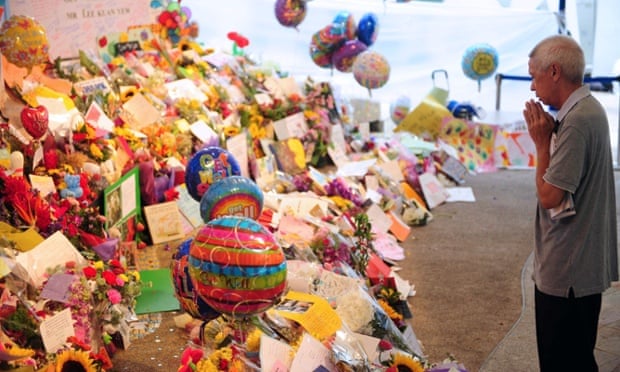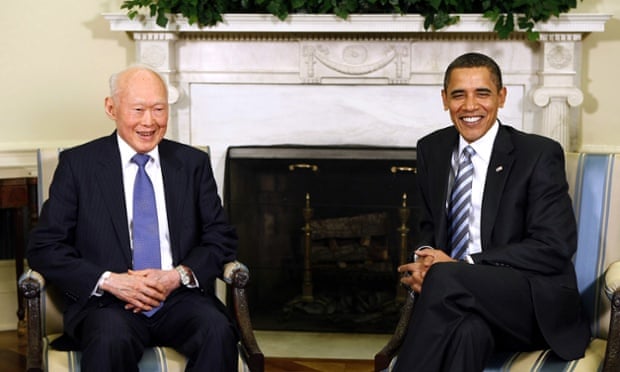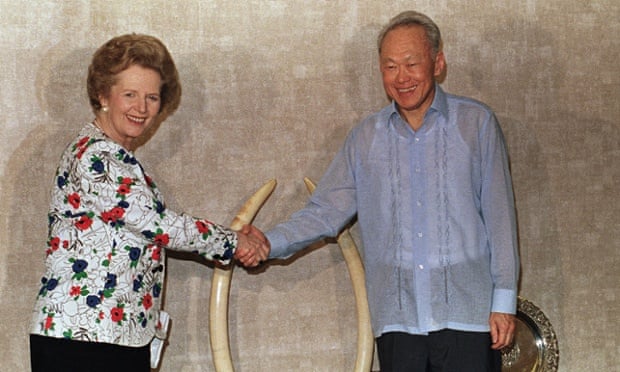This post is on Healthwise
Singapore’s founding father, Lee Kuan Yew, who led the city-state for more than three decades, has died aged 91.
Lee’s son and current prime minister, Lee Hsien Loong, announced the news in the early hours of Monday morning local time, prompting a flurry of tributes from world leaders.
US president Barack Obama called Lee and “true giant of history” while UN secretary-general Ban Ki-moon called him a “legendary figure in Asia”.
His son struggled to hold back tears when he made a televised address to the nation., saying Lee had built a nation and given Singaporeans a proud national identity.

Speaking in Malay, Mandarin and English, the prime minister said: “We won’t see another man like him. To many Singaporeans, and indeed others too, Lee Kuan Yew was Singapore,” he said.
Lee said that his father would lie in state from 25-28 March at Parliament House so the public could pay their respects, with the state funeral on 29 March.
He has declared a period of national mourning from 23-29 March, with state flags on government buildings at half mast until Sunday.
The People’s Action party (PAP) – the party that Lee led to electoral victory in 1959, which has governed Singapore ever since – set up a tribute website tributetolky.org.
Lee, a Cambridge-educated lawyer, is widely credited with building Singapore into one of the world’s wealthiest nations on a per capita basis with a strong, pervasive role for the state and little patience for dissent.
He co-founded the PAP and led the newly born country when it was separated from Malaysia in 1965.

He stepped down as prime minister in 1990, handing power to Goh Chok Tong, but remained influential as senior minister in Goh’s cabinet and subsequently as “minister mentor” when Lee Hsien Loong became prime minister in 2004.
The older Lee left the cabinet in 2011 and had cut down his public appearances in recent months due to his age and declining health. Lee was admitted to Singapore general hospital on 5 February for severe pneumonia and was later put on life support.
Lee was feared for his authoritarian tactics but insisted that strict limits on speech and public protest were necessary to maintain stability in the multi-ethnic and multi-religious country.
Maligah Thangavello, 55, and Dorai Josephine, 57, who are both healthcare assistants at Singapore general hospital, heard the news when they got on the bus on their way to work.
“We treat him like our father,” said Maligah in tears. “When I was 10, he came to my school and shook hands with all of us.”
“He is far away from us now,” said Dorai Josephine. “He was like a king, the king of Singapore. He did the best for Singapore.”
“We treat him like our father,” said Maligah in tears. “When I was 10, he came to my school and shook hands with all of us.”
“He is far away from us now,” said Dorai Josephine. “He was like a king, the king of Singapore. He did the best for Singapore.”
In a White House statement, Obama said that he appreciated Lee’s wisdom, including during discussions they held on his trip to Singapore in 2009 when he was formulating his Asia-Pacific policy.
“He was a true giant of history who will be remembered for generations to come as the father of modern Singapore and as one the great strategists of Asian affairs,” Obama said.

The British prime minister, David Cameron, said: “Lady Thatcher once said that there was no prime minister she admired more than Mr Lee for ‘the strength of his convictions, the clarity of his views, the directness of his speech and his vision of the way ahead’. His place in history is assured, as a leader and as one of the modern world’s foremost statesmen.”
The Australian foreign minister, Julie Bishop, also paid tribute to Lee, calling him a political giant.
“The passing of a giant like Lee Kuan Yew is the end of an era,” Bishop told Sky News.
In a letter of condolence to Lee’s son, Singapore’s president Tony Tan said: “Mr Lee dedicated his entire life to Singapore from his first position as a legal advisor to the labour unions in the 1950s after his graduation from Cambridge University to his undisputed role as the architect of our modern Republic. Few have demonstrated such complete commitment to a cause greater than themselves.”
- This article was amended on Monday 23 March 2015 to correct a misspelling of Lee Kuan Yew’s name and to correct the time of the announcement of his death.
Go to Healthwise for more articles
- on Lee Kuan Yew